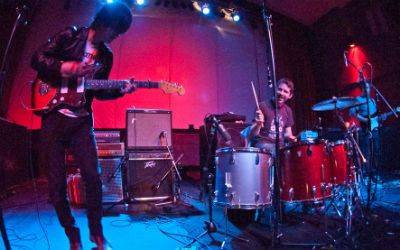The Dodos’ new album, Carrier, is not like any of their past releases. It’s not a dramatic change—the band is not suddenly playing math rock or disco or anything else radically different—but it is noticeable immediately. What exactly is different about Carrier is hard to pin down, however. It’s like seeing an actor in a new movie and knowing you’ve seen him before but not being able to recall what movie you’ve seen him in previously.
The subtlety in the variation between Carrier and The Dodos’ past releases is a result of a several changes in the lives of guitarist and singer Meric Long and drummer Logan Kroeber’s lives. Kroeber elucidated some of the changes that led to the creation of Carrier, including shifting personal styles, recording in a new studio, and personal loss.
One of the more obvious shifts for The Dodos on their new album lies in Kroeger’s drumming. In their previous four albums, the band’s throbbing, intricate rhythms had become something of a hallmark. The heavy drumming on songs like “Black Night” or rapid tapping on “Fools” helped the band stand in stark contrast to other indie acts.
On Carrier, the beats are certainly still intricate and unusual, at least in their timing, but they are somewhat restrained. Kroeber said much of this sonic change could be attributed to his switch from his uniquely styled kit to a standard drum set.
I had been, in my off time – before we started working on songs for Carrier—I had been trying to get back into playing a normal drum kit again, not thinking I would be using that for The Dodos…. I was getting into it for my own good and Meric and I started playing and he said not to change it, we’ll figure it out, we’ll make it work into our stuff.
Other changes in the rhythms came as a result of Long’s song writing style. Kroeber explained that, when Long sat down to write songs for Carrier, he started playing with longer phrases. Expanding from phrases of eight measures to some that stretched as long as 30, sometimes changing time signatures within the phrase.

Another noticeable shift in the percussion on Carrier is not due to Kroeber’s kit, but rather to the environment in which the band recorded.
The Dodos’ three albums prior to Carrier were recorded in Portland, Ore., with John Askew. For their fifth studio album, the band decided to record in their hometown, San Francisco, at John Vanderslice’s studio, Tiny Telephone. For production, the band also teamed up with Jay Pellici (Cody Chestnutt, Deerhoof). The result, according to Kroeber, is a sound that feels more crisp.
Askew has a really aggressive approach to percussion and uses a lot of room sounds in a blown-out kind of way… [At Tiny Telephone] we were figuring out what the new direction was going to be, and it is a bit more subdued…I feel like Carrier was a learning record for us and the engineers.
Another noticeable shift in the sound of Carrier was not as pleasant for Kroeber to discuss. Prior to the writing of Carrier, the band added a third member, Chris Reimer. Before the band could write the new album, however, Reimer passed away at age 26.
As a result, Reimer’s spirit is evident throughout Carrier. Whereas Long had returned to the acoustic guitar that brought The Dodos to prominence on No Color, the band’s last album, on Carrier he mostly sticks to Reimer’s instrument of choice, the electric guitar. Reimer’s spirit is noticeable present in the lyrics as well.
For Kroeber, the effect of Reimer’s passing on the lyrical content of Carrier was evident immediately, and he was proud to have been a part of something made to honor the memory of a friend.
We dealt with [the loss of Reimer] on a personal level before it turned musical…we expressed a lot of our emotions to each other and his family and friends. As Meric started writing lyrics and such, I could assume that what he was writing about could be about Chris or some other tragic stuff that happened around the same time, but it felt good that I didn’t really have to guess because we had gotten a lot of the real emotional stuff out in our personal lives. It was also great to be able to assume that we were trying to make something awesome in Chris’s memory at all times.
The final result, the band’s first album for Champaign’s own Polyvinyl Records, is a strong album. Perhaps not the band’s strongest, but a nice complement to The Dodos’ past work.
The variation in the bands’ sound that is so subtly obvious is akin to the oft-sought maturity reviewers seek from established band. It shows The Dodos as a band who can progress and try different things, rather than returning to the source of their original rise to prominence.
Fans can expect to continue hearing The Dodos progress as a band, too. Kroeber explained that the band has already finished the recording for Carrier’s follow-up, once again spending time at Tiny Telephone to lay down nine tracks for a future release. The sound, he said, is an expansion of the work done on Carrier, continuing to smooth out the rough edges and come up with a product that sounds distinctly Dodos yet refined.
Likewise, fans can expect to hear that sound from the band when they hit the Highdive this evening. Though the band won’t be backed by the Magik Magik Orchestra, as on Carrier, they will round out their sound with multi-instrumentalist Joe Haege (31 Knots) as they share songs from their latest effort and their back catalog.
Kroeber seemed genuinely excited to be returning to Champaign, especially as a Polyvinyl recording artist.
The branch in San Francisco, they’re like 7 blocks from my apartment. That’s what I think of as Polyvinyl right now, but I know there will be a lot more history in Champaign. It will be great to get the full picture.
Cousins will open for The Dodos this evening, with doors opening at 7 p.m. and music starting at 7:30 p.m.








